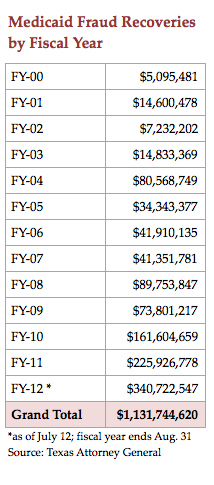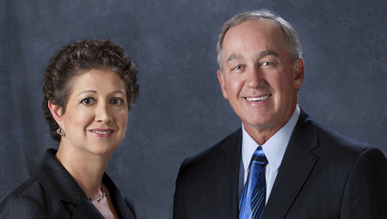© 2012 The Texas Lawbook.
By Janet Elliott
Staff Writer for The Texas Lawbook
AUSTIN (July 24, 2012) – Texas has become a national leader in teaming with whistleblowers to punish corporations that cheat its Medicaid program, recovering more than $1 billion from drug and other health care providers since 2000.
The state kept $383.3 million, plus $82 million in attorney fees. It sent $520.4 million to the federal government and $145.7 million to whistleblowers and their lawyers.

The litigation not only has benefitted government coffers, but has been a boon to lawyers who represent the whistleblowers and those who defend corporations against the claims.
“It’s one of the few areas that has been immune from the so-called tort reform movement,” says Tom Melsheimer, a Dallas lawyer who represented whistleblower Allan Jones in the state’s largest Medicaid fraud recovery, January’s $158 million mid-trial settlement with Johnson & Johnson over false marketing of its Risperdal antipsychotic.
The recoveries have taken off since 2007, when Texas Attorney General Greg Abbott requested money to hire additional lawyers after being questioned by legislative budget writers about 140 Medicaid fraud cases that were languishing for lack of manpower.
Under the leadership of Raymond Winter, the office has grown from nine lawyers to 33, and recoveries have leapt from $41.3 million in 2007 to more than $340 million during the first 10 months of the 2012 fiscal year.
Texas’ success, particularly in a series of drug pricing cases filed by the owners of a small Florida pharmacy, has spread to other states. More than 28 states have their own whistleblower provisions similar to those in the Texas Medicaid Fraud Prevention Act. Even Congress has taken note, rewarding states with strong laws like Texas by allowing them to keep a greater share of money recovered.
Patrick Burns, a spokesman for the pro-whistleblower group Taxpayers Against Fraud, says that then-Attorney General John Cornyn was indeed the big guy in the white hat leading the posse out to protect the tax-paying folk from those scoundrels who were stealing their money.
“The truth of the matter is, if Texas waited around for Uncle Sam to step up on the horse and ride up for the bad guys, they’d still be waiting,” says Burns.
“I would like to say that salvation came from Washington,” he adds. “I would like to say it came from Democrats. It came from a Republican attorney general, it came out of Texas, Florida, the private bar and it came out of the West.”
Texas added whistleblower provisions to its law in 1997, similar to those in the federal False Claims Act. The cases begin when a whistleblower files a lawsuit under seal and presents information to the Texas Attorney General’s Office. Lawyers with the Civil Medicaid Fraud Division can initiate an investigation of the claims, using their authority to file civil investigative demands with the potential defendants.
If they join a lawsuit, it is unsealed. Recoveries are split between the federal and state governments, and whistleblowers are allowed to collect 15 to 25 percent of the amount recovered.
Damages Mount While Cases Under Seal
Defense lawyers criticize the law for allowing the state to keep cases under seal for years, during which time the defendant continues doing business with the state while the damages mount up for the state.
All but two of more than 200 cases have settled before trial.
Austin lawyer Joe Knight, who participated in the appeal of the only Texas Medicaid fraud case to reach a jury verdict, says it’s no surprise that so many defendants settle in the face of treble damages and penalties.

“It sets the stage for pretty one-sided settlement negotiations,” he says.
“I do think there’s something wrong with a statute that would allow the state to continue doing business with somebody on terms the state has already concluded to be fraudulent without notifying the other party that the State has made that allegation,” says Knight, managing partner of Baker Botts’ Austin office.
After a Travis County jury last year determined that pharmaceutical manufacturer Actavis should pay Texas and the federal government $170.3 million for fraudulent pricing of its generic drugs, the company sought a new trial, claiming that the Texas statute violates constitutional standards for fundamental fairness in civil actions.
In the three years before the case was unsealed, Actavis argued, not only did the state not notify the company of its allegations but the Legislature increased the minimum penalty from $1,000 to $5,000 per violation and reduced the standard of proof for punitive damages.
The Actavis co-defendants dropped their appeal last December and settled for $84 million. AG spokesman Tom Kelley says the settlement was based on the ability of the defendants to pay.
From Key West to Austin
The genesis of Texas’ success began in 1999 when Austin lawyer Pat O’Connell went to work for newly elected AG Cornyn as the head of a small section initiated to civilly prosecute fraud in the state’s huge Medicaid program. He reviewed several cases filed by the owners of a small pharmacy in Key West named Ven-A-Care alleging widespread overpricing of drugs sold to government programs.

O’Connell says the cases, which also were filed in federal court, had been languishing because Justice Department lawyers weren’t interested. O’Connell decided to intervene in 2000, making Texas the first example of a state intervening in whistleblower-initiated litigation targeting fraudulent drug price reporting.
The Ven-A-Care line of cases has generated $498 million for Texas out of an overall $2 billion collected by the federal government and other states. Jan Soifer, O’Connell’s wife and law partner, says the litigation also led to changes in how pharmaceutical companies report prices, saving taxpayers billions of dollars going forward.
In June 2005 testimony to U.S. Senate Finance Committee, O’Connell said he didn’t initially plan to concentrate so heavily on drug manufacturers.
“The fact is that whistleblowers brought us cases which showed significant fraud in amounts which dwarfed the cases against other providers. Because of the limited number of staff and resources we can bring to any one case, we chose to pursue those cases which provided the greatest return to the Medicaid program,” he testified.
O’Connell left the AG’s office in 2007 and formed O’Connell & Soifer, an Austin law firm devoted solely to whistleblower representation.
Litigation to Continue
Although the Ven-A-Care cases are winding down, Abbott’s office says the upward trend of Medicaid fraud recoveries is expected to continue as more cases than ever are being filed for review.
The review process is a critical for whistleblowers and their counsel to gain the attention of government lawyers.
“You’ve got to sell them on the merits of your case, which requires you to understand the facts and the law in a very detailed way,” says Melsheimer, a former federal prosecutor.
The AG’s office or Justice Department also wants to know what kind of resources the private lawyers bring to the table.
“They told me flat out that one of the reasons they were willing to take this massive case was because I told them that we were going to put our best lawyers and our financial support behind the case,” said Melsheimer, managing principal of Fish & Richardson’s Dallas office.
The Fish & Richardson team took a lead role in managing the case against J&J subsidiary Janssen Pharmaceuticals, including 10 million pages of documents and 150 depositions.
Dealing with whistleblowers who may have lost their jobs and friends while pursuing their cases can present challenges, but offers potential high rewards. Fish & Richardson pocketed $26 million from its representation of Allen Jones, a former Pennsylvania state investigator who uncovered the Risperdal false marketing scheme. Jones received $20 million.
Matt Orwig, a Jones Day partner, has handled whistleblower cases in private practice and earlier as the U.S. Attorney for the Eastern District of Texas. He thinks they will be a significant growth area for lawyers.
“Not only is the number increasing but the amounts involved will set new records,” he says. “Health care, pharmaceutical, government contracts, energy…virtually every sector of the economy will be touched by these suits.”
© 2012 The Texas Lawbook. Content of The Texas Lawbook is controlled and protected by specific licensing agreements with our subscribers and under federal copyright laws. Any distribution of this content without the consent of The Texas Lawbook is prohibited.
